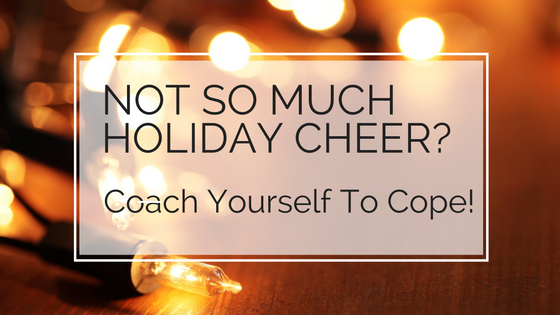Tips to Conquer Holiday Anxiety Disorder
Magical holidays? Not for everyone.We’resupposed to feel festive… energetic… excited! We’resupposed to look forward to the New Year with anticipation and, well, happiness – itis‘Happy New Year,’ right? So, why does this time of year create so much stress and anxiety? Why are so many people exhausted, even depressed under their cheery fades?
Since the first step in working through a problem is to recognize, define and accept it, let’s face it –the holiday season CAN be fun, but it can also be incredibly challenging. Especially this year, with the intense political discord and the many natural disasters. So give yourself a break!
Sure, there are tons of positive things about the holidays, including the window displays, the festivity, the spirituality and the family bonding. But there are also tons of stressors, like the time and effort of preparing for family gatherings, parties, travel arrangements, shopping, the additional expenses, rush to complete work projects, etc.
First it’s the Thanksgiving gathering (ifyou have people with whom you gather, and if you don’t, you might feel a sense of isolation). Having people over, for the somewhat disorganized, can be a time-consuming quagmire. It isn’t just the meal prep; it’s clearing the paper clutter off the dining table and finding hiding spots for the various piles of stuff. And the traveling doesn’t help – especially if stuck in holiday traffic (I admit it; I’ve skipped family events to avoid a two-hour traffic jam).
Thanksgiving Day immediately segues into the holiday buying frenzy, with its extra expenses and the stress of gift-buying, magnified by the pressure of getting those perfect bargains during Black Friday and Cyber Monday (now week-long, or longer, events). This is further complicated by the anxiety caused by FOMO – fear of missing out, whether it’s the sale of the century or that special party invite.Who has invited you where (and who hasn’t)? How should you reciprocate? What should you wear? And woe if you’ve gained or lost weight and don’t feel attractive in the holiday clothes you have! Even the lack of sunlight can darken the mood of people with a degree of SAD (seasonal affective disorder).
Then there are the interpersonal issues. Whether it’s home for the holidays and dealing with complicated family relationships, or the feelings of loss when you think about missing loved ones or the lack of a significant other with whom to share a New Year’s kiss. There is alsothe double-edged pleasure of having children home from school, especially if you still have to work. And magnify the difficulty if you have children who get easily overwhelmed or overly excited by a disruption of their routine.
On a more subtle note, there’s a sense of judgement. The year is about to end, and what have you accomplished? Sometimes it’s external evaluations at work, which may, or may not, include raises and bonuses. But often it’s an internal sense of“I planned to do more…”.Unfortunately, we tend to dwell more on what we didn’t do than celebrate everything wedidaccomplish. Like a birthday, the upcoming New Year is a passage, and an opportunity (welcome or not) to pause and look at where we are in life.
I can go on, but now that it’s really clear you have valid reasons to feel Holiday Anxiety Disorder, let’s switch to what we can do differently to have a better, more fulfilling holiday season.
Let Go of the ‘Shoulds’
Many of us dwell in a mental world of how things should be. Relationships are warm, fuzzy and supportive. Money is not a concern. We’re easily able to leap tall buildings, which represents any obstacle, whether preparing a holiday meal or completing a work project early and under budget. Our children are always a joy, and our parents are never a problem. Realistically, we know that’s ridiculous. But there’s a part of us that wants it to be that way, and thinks it should be that way. Until we embrace imperfection and still delight in ourselves and others –despite our failings, and theirs– we’re doomed to feel like failures.
Practice Intentional Rejuvenation
Schedule in ‘ME’ time. Consider it as My Energy; time to recharge. It might mean a massage, distraction-free time to read, draw, play the guitar or go for a walk – whatever recharges your sense of self, so you’ll have more to give to others. If you spend too much time alone, working or taking care of your family, plan get-togethers with friends. Let go of the guilt that comes from having too little time to get things done or take care of others, so you give even less to yourself. As the airlines say, ‘put the oxygen mask on yourself before you worry about others. ‘Keep in mind thatself-care is not the same as ME time. Things like going to the gym are important for self-care, but there aren’t ME time, unless you love going to the gym!
Put Your Health First
Alas, that includes getting enough sleep, eating right, staying hydrated and exercising. These are all critical for real self-care. They take effort, but the payoff is that you’ll have more energy, and feel a lot less stressed. And for those of us with ADHD, depression or anxiety, these have proven, brain-based benefits. Studies show that spending some time in nature, even in winter, helps positivity. Get outside, even if it’s cold. Use natural daylight bulbs. And consider appropriate supplements, like Vitamin D and Omega-3.
Give Yourself Permission
It’s okay to decline an invitation. It’s okay to serve fewer choices at a meal or have less elaborate holiday decorations. And it’s okay to ask for help.
Set Limits
This might be the dollar amount or the number of gifts you’ll purchase. It might mean how much time you’ll spend shopping (maybe the online purchase isn’t as perfect as something you’d pick out in a store, but it’s a lot easier!). Also, consider how you can say no to unacceptable behavior, whether from a child, friend or family member. This also applies to work. Learn to say NO to yourself! Perfectionism destroys productivity. Be realistic in terms of what you can accomplish in a given time, and what you can’t. Have clear priorities and learn to self-advocate.
Journal
Write down your frustrations – it’s better than taking them out on others, or yourself. Keep a gratitude journal to remind yourself of what you have, and what you’ve done. Keep a list of what you can do differently next year, and a reminder of what you’ve done that works. (Don’t count on remembering anything, although do try to remember where you keep your Journal and lists!)
Pause – Breathe – Appreciate
Life is a collection of moments, so capture those moments by being truly present. Mindfulness is a way of staying centered, and when we’re centered in the moment we can’t be disappointed by the past or anxious about the future.
Expect Breakdowns
It’s extremely rare when everything works as planned. Stuff happens. Being flexible and building in the expectation that there will be occasional breakdowns and meltdowns makes it easier to deal with them when they (inevitably) happen, and increases the likelihood that your holidays will be successful!
Focus on the Positive
In my 7-Step PowerPlan to Success, Step 3 is‘Believe in Possibility, and that you always have the Power of Choice.’When you truly believe that youwillhave a wonderful, fulfilling holiday season, and that the upcoming year will be your best one yet, you dramatically increase the likelihood it will be. Positive thinking is critical to successful action.How we think absolutely affects what we attract in our lives.
Plan for Success
A positive attitude is essential, but achieving goals is more likely when there’s also a plan in place. It’s helpful to have clarity as to goals and priorities, and the steps you’ll take to reach them, whether it’s planning for December 25th, New Year’s Eve or the upcoming year. If you need help with your Success Plan, let me know!
Have the Happiest of Holidays!!!
What are your tips to conquer Holiday Anxiety Disorder? I’d love to see them, so share them on myblog.
This article may be reposted, only with the following attribution:
Written by Susan Lasky, Productivity, ADD/ADHD, Executive Function & Organization Coach. Susan Lasky Productivity Solutions, www.SusanLasky.com. Used with permission.




